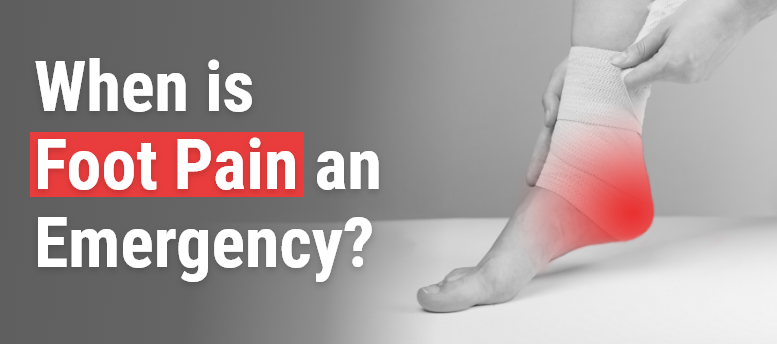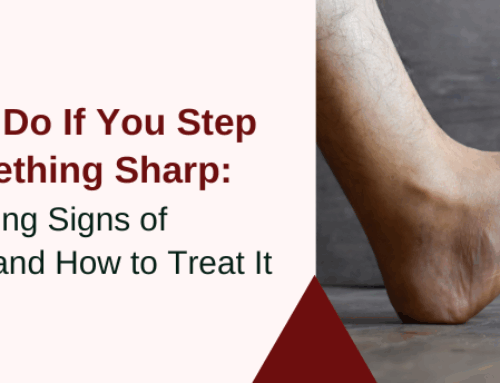Chances are high that at some point in your life, you will experience some type of foot pain. The American Podiatric Medical Association states that about 80% of foot pain sufferers experience constant pain. Although these numbers represent just how common foot pain is, only a surprising third of these people seek care from a podiatrist.
Our feet are complex structures made up of a network of bones, ligaments, tendons, and muscles working together in harmony to literally keep you on your feet. A good many problems with the feet are a result of a lifetime of overuse and neglect, including wearing improper footwear and not seeking medical attention when injuries occur. By the time you reach 50, you will have walked about 75,000 miles!
When do you need urgent care for foot pain?
Podiatry is a specialized field of medicine that treats ailments with the feet. A podiatrist isn’t just a foot doctor, however. They are specialists in foot and ankle care. A podiatrist treats chronic conditions of the foot as well as foot injuries, provides surgical intervention, resets broken bones, and prescribes medication.
Minor foot pain can often be treated with at home remedies, as long as the pain is minimal, there are no signs of infection, and there are no protruding bones. Foot pain caused by overuse or a minor injury often will respond to cold therapy and rest. Anti-inflammatory over the counter medications also help relieve minor foot pain and can help with the healing process. Any activity that aggravates the pain should be avoided.
If the cause of your foot pain is unknown, is widespread or in both feet – particularly if you are diabetic – it is advisable to make an appointment with a podiatrist or seek urgent care for foot pain when the pain is severe, there are signs of infection, or if there is an obvious protrusion of bone.
Schedule an office visit if:
- there is persistent swelling that shows no improvement after two to five days of home treatment.
- you have persistent pain that shows no signs of improvement after several weeks.
- you are experiencing burning pain, numbness, or tingling, particularly when it involves most or all of the bottom of your foot.
Seek immediate medical attention if - you are experiencing severe pain or swelling.
- you have an open wound or a wound that is oozing pus.
- there are signs of infection, like redness, warmth or tenderness in the affected area or you have a fever that is over 100 F.
- you are unable to put weight on your foot or walk.
- you are diabetic and have a wound that is deep, red, swollen or warm to the touch, or a wound that isn’t healing.
What Urgent Foot and Ankle Problems Require Podiatrist Treatment?
People of all ages seek the help of an emergency foot doctor for a number of reasons. A podiatrist treats many foot and ankle conditions including:
- Diabetic foot pain – A podiatrist helps patients with diabetes understand how diabetes affects their feet and recommends proper foot care techniques to limit the negative impact diabetes has on the feet. Diabetics are especially at risk for foot damage due to vascular disease and peripheral neuropathy (damage to nerves) that can cause numbness, tingling, restricted blood flow, gangrene, ulcers, and many other problems with the feet. Diabetes can also slow the healing process, and lead to ulcers and infections.
- Bunions and hammertoes – These painful conditions affect the bones of the feet. A bunion is the result of the joint at the base of the big toe becoming enlarged or displaced. A hammertoe is the result of a toe that has an abnormal bend in the middle joint.
- Fractures and sprains – Fractures and sprains are the most common injuries that affect the foot and ankle. Fractures in the foot or ankle often require a cast. Sprains require rest in order for the ligaments to heal properly.
- Metatarsalgia – Metatarsalgia is a condition in which the ball of your foot becomes painful and inflamed. This condition is often the result of activities that involve running or jumping, wearing shoes that fit too tight, feet with high arches, and excess body weight.
Tips for Keeping Your Feet Healthy
Our feet are probably the most used and abused parts of our bodies with all of the walking and running around we do every day. When it comes to our daily health routines, feet and toenails are also often the most neglected. No matter what your lifestyle is or what the season is, it is important to always take good care of your feet.
Some tips for maintaining good foot health are:
- Practice good hygiene. Make sure to wash your feet daily.
- Wear proper footwear. You want footwear that fits properly and keep your feet clean, dry, and at a comfortable temperature.
- Prevent foot odor. Not only are smelly feet offensive, but they also create a hotbed for bacteria growth. Our feet sweat more than any other part of our body, so keep them clean and dry, and change your socks more often.
- Take care of those toenails! Clean, well trimmed toenails help prevent issues with foot and toenail fungus, and ingrown toenails.
- Moisturize your feet daily. Our feet become dry from constant wear and tear, and dry skin is less elastic and more prone to cracking and tearing. The soles of our feet are pressed to the ground constantly, making them more susceptible to this kind of damage, mostly in the form of cracked heels.
Whether you need advice on foot care or need treatment for an injury or severe pain Urgent Care For Feet is here to help. We are your best option for treatment when it comes to foot and ankle issues because you will be seen and treated by a doctor who specializes in the treatment of foot and ankle injuries and problems. All of our doctors have on average 15+ years of experience specializing in foot and ankle care. Schedule an appointment today.




